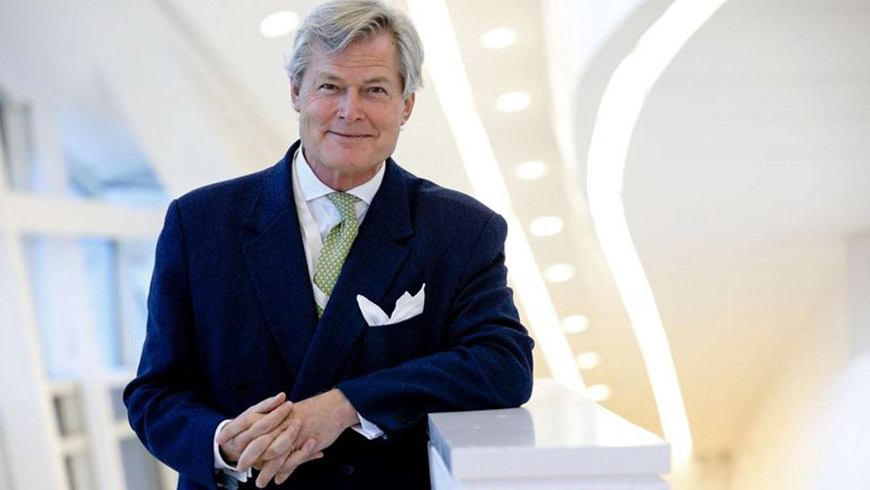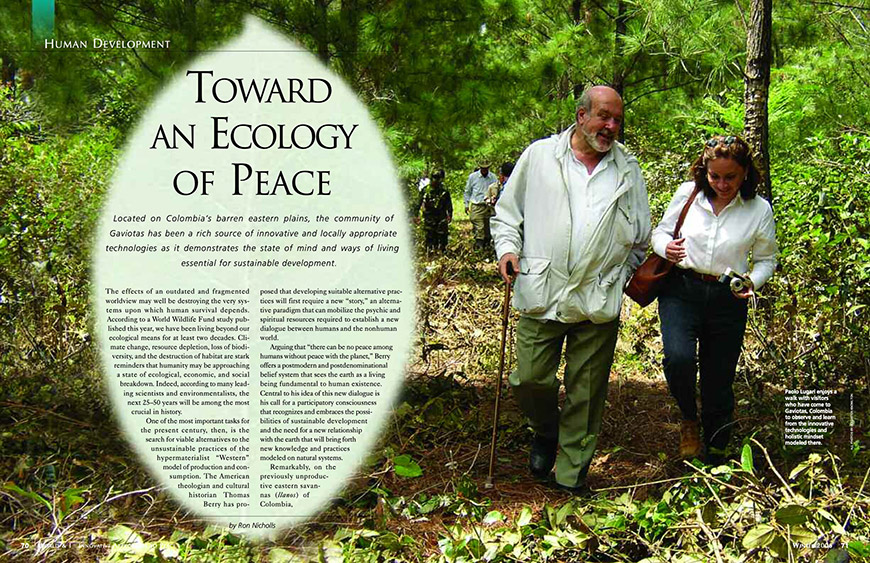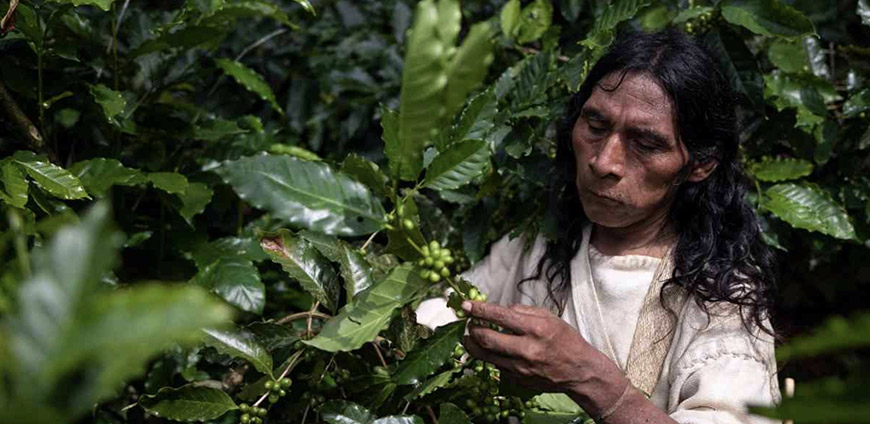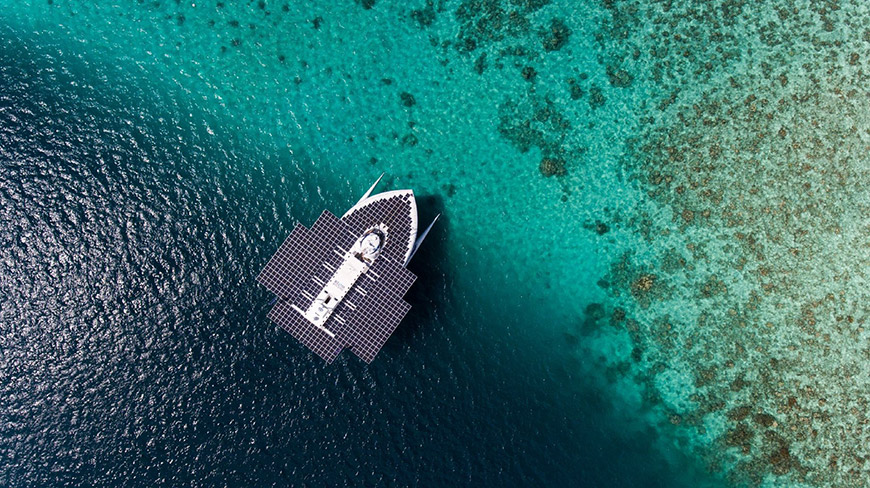
The Future Beyond Imagination
Keynote delivered by Gunter Pauli on the occasion of the remittance of the Goi Peace Award
Do not expect the Earth to Produce More.
Do more with what the Earth produces.
No words can ever express my gratitude to the organizers of the Goi Peace Award for this recognition. I am sure that you considered personalities with a more worthy track record. However, since you decided, permit me to undertake my best to respond in all humility to the challenge.
Four Decades
Over the past 4 decades I have accepted the responsibility for tasks and initiatives no one has ever asked me to assume: a responsibility to correct the errors of the past, and a commitment to create better living conditions for generations to come. As I witnessed during my endeavors for the common good around the world a dramatic drop in our capacity to respond to people’s needs, a demise of local communities, an increase of poverty, hunger, a shrinking of the middle class and the dramatically high suicide rates which are seldom communicated, I was emboldened in my commitment. As a member of the Club of Rome for nearly 3 decades, I always look at reality as if it were an ecosystem – connecting all the dots to discover and weave solutions together. Permit me to describe one of my first initiatives.
Regenerating Ecosystems – not forests
When in 1984 I visited the Vichada of Colombia, I discovered a vast area of 6 million hectares of savannah bordering Venezuela. Few realize that this desolate area was an early attempt to turn a forest into cattle farms. The Spanish colonizers cleared trees for meat production. It failed and the terrain was abandoned. No one ever attempted to remediate the destruction. So, the region degraded into a land strive of poverty and violence.
When we observed the hard reality generations later, Paolo Lugari, a Colombian social innovator, imagined how to regenerate the forest. I supported his vision. We persevered against all logic and wisdom prevailing at the time. We learned how a dense fungal growth around the roots would give the new tree cover a chance to survive 9 months of scorching heat and 3 months of torrential rainfall. We created a nursery, irrigated the young trees with fungus. We had a 92% survival rate. As the terrain was covered with shade, the warm rain percolated the land bringing nutrients deep into the soil. The birds and bees brought life back with over 250 plant species. This area produces drinking water. It is one of the largest carbon sinks ever. We regenerated an ecosystem.

Article published in WorldWatch Magazine Winter 2006.
Jobs and Health
The once devastated land is now the only area of Colombia with full employment. The forest generates revenues from a local industry extracting colophon (for the paint industry) and turpentine (a natural fuel for combustion engines) from the trees’ resin. All energy is local and renewable. When food, water and energy are local, money remains local. The economy starts emulating ecosystems where whatever is required for life is free. We applied that logic to the local community and supply free drinking water since 30 years. Then, all children at the age of 6 receive a bike for their birthday. What happens to a society when children ride the bike every day and drink three liters of fresh water a day?
Fast forward: 8,000 hectares of rainforest have been regenerated, the local population suffering van gastro-intestinal diseases is now amongst the healthiest in the nation – so much so that the hospital was closed for a lack of patients. We created a region of employment without violence. We made a peace gesture: everyone coming to this region would be given all water they could carry for free. Second, it was decided not to have a mayor or an elected leader, since these individuals are prone to extortion and kidnapping. We learned the hard way that permanent peace requires social, environmental and economic innovations.
Colombia – Spain and Zimbabwe
Ladies and Gentlemen, peace implies that all basic needs are met, that people have jobs, that communities can aspire to advance in the foreseeable future, and that children can do better than their parents. There is a dream everyone can pursue. After this experience in Colombia, I joined forces to undertake comparable initiatives in Spain on the island of El Hierro, the first island self-sufficient in water and power. Chido, my daughter set out to provide a future for the orphan girls in Zimbabwe and created mushroom farming communities, eradicating hunger using the left-overs of coffee beans. We only consume a small fraction of the harvested coffee cherries. These left-overs are turned in a substrate to farm mushrooms. When girls have their own food, they do not tolerate abuse, and build their future.

Margaret Tagwira from Africa University in Mutare (Zimbabwe) harvesting and domesticating wild mushrooms ©1997
The pursuit of these innovations requires an independent mind. I have been very privileged to have always kept my independence. Encouraged by two lifetime mentors, Aurelio Peccei, the founder of the Club of Rome and an industrialist, and Elie Wiesel, the Nobel Peace laureate. Both leaders of thought and action encouraged me to assume responsibility where no others would dare, and to follow my heart more than the logic of my mind. They called upon me to strengthen and expand my consciousness.
The Systems’ Analysis
The Club of Rome taught me that the best study of the hard realities before us is a “systems analysis”. I observed how mathematical models in the late sixties were able to simulate disaster, as well as solutions. These models developed by Prof. Jay Forester at MIT (USA) became my preferred working tool. I spend hours to discover all relations, feedback loops and multiplier effects amongst seemingly unrelated problems and solutions. The result supported by great teams of scientists and activists helped me foresee the unintended consequences as well the accelerators and diffusers of solutions.
The new Art de Vivre
As I progressed with a portfolio of initiatives I realized the need for society to study history. Could we ever avoid repeating the errors of the past? I identified cultures around the world that had succeeded in turning the hard reality of the demise of their identity and culture in the face of aggression around. Surprisingly, not far from where we embarked on the regeneration of the rainforest we learned about the Kogi culture. When the Kogi were face to face with the Spanish invaders in the early 16th century, they retreated. The fishermen and farmers decided to establish a new community at +2,000 meters altitude in the Sierra Nevada de Santa Marta where the Spanish in armor could never wage war. They turned into the architects and designers of communities with dozens of settlements, terraces for farming, fresh water irrigation and waste water management.
However, their two centuries of isolation came to an abrupt end when all land that the indigenous cultures had secured from the Spanish Crown were confiscated. The fathers of independence wrote a new constitution that stipulated that they owned all property. This gave a blanc permission to chase the survivors of the indigenous tribes off their land. The Kogi did not confront this second aggression either. In line with the peaceful mindset of their ancestors, they retreated to higher altitudes where the land was considered of no value for farming. The Kogi had to find a new Art de Vivre for the second time.
Design Life with Wisdom Everywhere
The Kogi had to forget what they knew: their wisdom of the past would not bring them to the future. The key question is how fast could they learn to survive in an environment where no one could teach them how to? The Kogi concluded that the only option was to listen to and learn from all life around them. And so they did! When explorers of the 20th century discovered their remarkable life style, a few global citizens set out to buy back the territories that were stolen from them. To everyone’s surprise, any land returned in any deplorable state would revive within few years under their care. Just a few decades later, the barren land would thrive with a highly diverse and productive rainforest. The farmer-fisherman, turned city engineer had become a communicator with everyone and everything in the ecosystem. The Kogi designed a simple life with wisdom all around.

Kogi farming coffee within the tropical rainforest of the Sierra Nevada de Santa Marta ©1997
Ladies and Gentleman, the Kogi never waged war, and even when their land was stolen and their survival was threatened they searched for inner peace: how to secure water and food for all with what they have. They adopted a new Art de Vivre. Now, in a world where we face over-population, over-consumption, large scale loss of biodiversity, and massive pollution with nano-plastics that permeate all forms of life starting from the baby in the mother’s womb, leads to the demise of the ecosystems on which life depends. Not only the Kogi, but all of us all need a new Art de Vivre. This art includes the capacity to discover what you have, find ways to respond to the basic needs of all – including Nature, build resilience and be prepared for the worst, embracing novel ideas and creative minds, putting ethics at the center with the capacity to persevere without ever responding to aggression with violence.
Capable to Adapt to New Realities
A world of hunger, despair, and fear is a world where extremism can thrive. Then, violence is strife and easy money from drugs and extortion drives a many disillusioned youngsters of a new generation that sees no other options. It is exactly under these conditions that we have to be bold and imagine solutions not just for a better world, but for a world that is capable of adapting to the new realities we are creating. Indeed, we seem to have the power to change everything around us, but we seem to be incapable of changing ourselves.
When the Club of Rome published its report in 1971 and concluded eloquently based on solid science that we need to change course, we did not. When there is no leadership at the top, then the only option is to take responsibility at the bottom. I am very grateful to the thousands of scientists and the hundreds of entrepreneurs who have inspired me and joined initiatives that contribute to a fundamental new reality. Our slogan has been: when it is possible, then please do it. If it is considered impossible, then let us make it happen.
Regenerating Biodiversity
When the book “The Blue Economy” was presented as a report to the Club of Rome General Assembly in November 2009 in Amsterdam I described how 100 innovations over 10 years could generate 100 million jobs. That was a bold statement. We have fallen short on the jobs, but have doubled the number of innovations. For example: we are introducing in 2022 a new fishing technique, using air bubbles. We are emulating the air curtains produced by dolphins and whales. These mammals tailor the size of these bubbles to the size of fishes in such a sophisticated manner that the heavier females with eggs can escape the air trap. This million year old fishing method secures that when fish is caught, more fish will thrive in the seas the following year. This innovation will lead to an overhaul of the world’s fishing fleet. We are starting with a huge ambition. We will transform the drama of overfishing into the regeneration of biodiversity at a speed unimagined before.
While the fishing technique was already announced in the original “Blue Economy” book, the capture and destruction of minute nano particles of plastics from sea water was not even imagined. We have learned how hundreds of millions of little sponges in our lungs connected to billions of capillary veins remove the CO2 molecules from our blood. We challenged scientists in biomedicine to study if the same smart solution could be deployed for extracting nano particles of plastics. I am very encouraged that within one year we have succeeded in constructing the first prototype. Our ambitions are again sky high. We aim to cleanse sea and river water at a rate of 1000 liters per second. It would take 1,000 cleansing units 10 years to remove the nano plastics from the Mediterranean, and it will require at least 2.5 billion in capital.
Generating Power
As if this were not enough, we introduced the combination of three ancient technology toys: the yoyo, kite and cuckoos clock to create the first wind power that operates 24 hours per day. Wind power that was never captured before is now offering base load energy. Who does not wish to redesign the future of their town, region or nation based on these and dozens additional innovations that make business sense?
The world suffers from “analysis – paralysis”. Over the years I adopted a different approach: focus on implementation. If and when we discover an opportunity to realize a fundamental shift, then we have to proceed to action. Thanks to extraordinary partners and friends like Yusuke Saraya, the industrialist from Osaka, we are outfitting the experimental ship Porrima with the novel air curtain fishing techniques and the removal system of nano plastics. We named the vessel “Porrima”: The Roman Goddess of the Future and Protector of Pregnant Women. The vessel which already circumnavigated the world twice with renewable energies, is now preparing for a third tour of the globe demonstrating innovations that can change reality on the ground. The MS Porrima will depart on December 15, 2021 from Osaka with solar, hydrogen, and kite technologies operating with artificial intelligence and robotics, harnessing wind power. The kite only uses 5% of the materials used in a windmill today. Porrima will return to Japan after circumnavigating the globe for the opening of the World Expo 2025 bringing the good news and the best experiences. This is a case of democratizing innovations. However forward thinking this is, it is not enough.

MS Porrima owned by Blue Innovations (Suisse) S.A. ©2018, Peter Charaf
Prepare the Next Generation
Ladies and Gentlemen, Distinguished Members of the Audience, standing here before you is an uncomfortable task, since the voice is one but the hands and the minds behind it are many. However, it is not good enough to build a better present, we need to prepare the next generations for the future. As a father of six children, I know that we cannot solve all the errors in one generation. This is a task for generations to come. Thirty years ago, I embarked on writing fables. These simple but surprising stories permitting us to ask the questions we never bothered to ask. Like: “How did the apple get up in the tree?” We know very well how the apple comes down following the law of gravity. However how did the apple defy the law of gravity? It must first get up before it can fall down. When parents and grandparents listen in despair to this very pertinent question, the child builds up self-confidence. It is indispensable that apart from the sciences and the engineering, children need to build up their emotional intelligence.
I have attempted in the precious time allotted to offer a philosophy of life, to share a lesson learned from history, and to offer a quick insight into a few novel technologies we pursue inspired by Nature. Whenever faced with a new challenge that I cannot solve, I remind myself that ecosystems have no waste, everyone contributes to the best of their abilities, there is no unemployed and everyone plays according to the rules: to promote life where we have the opportunity to live and steer life towards a better future with wisdom. If we are prepared to learn this from Nature, then we may finally be as intelligent as she is.
There is always a difference between the spoken word and the written text.
While the intentions are the same, only the written document prevails in the case of confusion.
